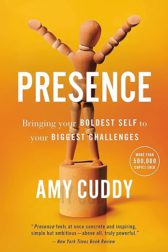Personal Power & Presence: Bringing Your Boldest Self to Your Biggest Challenges
Many of our biggest challenges call for us to be calmly confident, focused, and open to hearing others. Too often, we approach these high-pressure interactions with fear, execute with anxiety and distraction, and leave with regret. Based on her best-selling book ...
Many of our biggest challenges call for us to be calmly confident, focused, and open to hearing others. Too often, we approach these high-pressure interactions with fear, execute with anxiety and distraction, and leave with regret. Based on her best-selling book Presence, Amy draws from psychology and neuroscience research, personal narratives, and her own challenges, focusing on:
- What holds us back from being present and effective in these challenging situations?
- How does feeling powerless (vs. powerful) affect our thoughts, emotions, and behaviors, in turn undermining our ability to be smart, creative, attentive, and effective when we most need to be?
- How do we retrain our nervous systems to liberate us — rather than inhibit us — in these moments?
- How does our own presence help others to be present — and facilitate the building of trust in stressful interactions?
- What does powerful vs. powerless body language look like?
- Can we adapt our own body language — breathing, speech patterns, simple and complex posture, and movement — to directly affect how powerful we feel (and how powerful we appear to others)?
Audiences will be moved and inspired, leaving Amy’s keynote with a fresh, life-changing perspective on themselves and their interactions, and a concrete and immediately-actionable set of simple techniques to harness their own personal power and presence, freeing them to perform and interact at their very best — and empower others to do the same.
